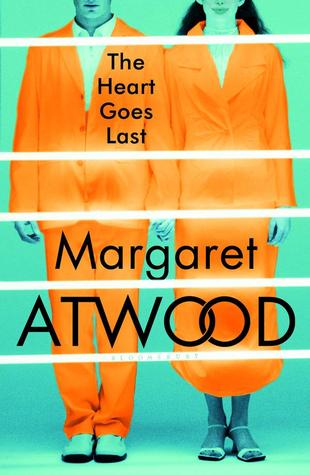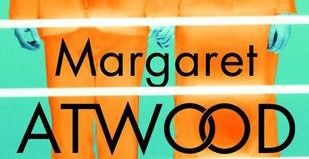 The Heart Goes Last by Margaret Atwood
The Heart Goes Last by Margaret Atwood Also by this author: Hag-Seed
Published by Knopf Doubleday Publishing Group on September 29th 2015
Genres: Science Fiction, Dystopian
Pages: 320




Margaret Atwood puts the human heart to the ultimate test in an utterly brilliant new novel that is as visionary as The Handmaid's Tale and as richly imagined as The Blind Assassin.
Stan and Charmaine are a married couple trying to stay afloat in the midst of an economic and social collapse. Job loss has forced them to live in their car, leaving them vulnerable to roving gangs. They desperately need to turn their situation around—and fast. The Positron Project in the town of Consilience seems to be the answer to their prayers. No one is unemployed and everyone gets a comfortable, clean house to live in . . . for six months out of the year. On alternating months, residents of Consilience must leave their homes and function as inmates in the Positron prison system. Once their month of service in the prison is completed, they can return to their "civilian" homes. At first, this doesn't seem like too much of a sacrifice to make in order to have a roof over one's head and food to eat. But when Charmaine becomes romantically involved with the man who lives in their house during the months when she and Stan are in the prison, a series of troubling events unfolds, putting Stan's life in danger. With each passing day, Positron looks less like a prayer answered and more like a chilling prophecy fulfilled.
From the Hardcover edition.
Review first appeared on The Speculative Herald
The Heart Goes Last is a dark and yet humorous vision of a dystopian future where the world has lost social order. Life is hard, money and resources are incredibly scarce and people fear for their safety as there is no longer police or social justice to keep people in line.
Charmaine and Stan, a young married couple, are lucky, for while they have lost their home and have little to their name, they have managed to hold on to their car, a safe haven from the streets. As they put it, their car is “the barrier between them and gang rape**“. Pretty much, this world is frightening and shows no mercy.
To be fair, there are areas further west where things have not become quite so desperate. But without the means to pay for gas for such a journey or any other way to get across the country, this haven is just mere fancy, a nice hypothetical “what if we could get out there”. In reality, it is nothing in the realm of possibilities, as the west may as well be located on the moon for all the good it does them.
But, a ray of hope opens near them. There is a new project, an idyllic city, walled off from the world they live in now, that is self sustaining. It promises everyone a job, a home, safety from the dangers they now face. They have given it a nostalgic setting, seeming to push back time to the picture perfect image of the 50s. Happy couples, going to their happy jobs, living in their happy little homes. Sounds amazing to anyone, much less those who are facing such dire circumstance. So, what’s the catch? The people running this project say they’ve worked it all out. They have a prison that provides jobs, so to support everyone, they set up a system where citizens rotate being prisoners, then being normal civilians. Each person has an “alternate”, the person that will live in their home while they reside in prison. This allows for half the number of houses for the population. Compared to life on the outside, even the prospect of being a prisoner sounds like an incredible dream with the promise of regular food, showers and safety. Too good to be true. Stan knows it has to be too good to be true, but he wants to believe it, and given their current life, how bad could it be? As they put it:
You can’t eat your so-called social liberties, and the human spirit pays no bills, and something needed to be done to relieve the pressure inside the social pressure-cooker **
There’s a wonderful exploration of free will in this book. You can’t help but see the advantages of this city, but at the same time, you also notice or at least suspect some costs. Some serious costs. What price is too high to pay for the peace of mind they found here? And what cost can make you question if that peace of mind is justified or just an illusion? The book also explores fantasies, as one character seems to perpetually live in her own version of reality. She takes the reality she is given and seems to twist everything inside of her mind to make it mesh with a reality she is capable of coping with, or perhaps the reality she wishes she has.
For those readers who are skittish about sex in books, you may want a heads up that while this book is not terribly graphic, there are many events that revolve around sexual encounters and relationships. These may be personal fantasy, they may be encounters with another person, or they may be with a robotic prostitute (prostibot). I found the different pairings interesting in how the motivations for the relationships contrasted quite a bit with each other and ran the gambit from love, to revenge to just plain fantasy.
There are also some seriously messed up, probably deranged, characters that I found incredibly amusing. Seriously, this book was a blast with complex characters as well as prostibots (complete with a flush cycle!). The futuristic dystopia really contrasted with the utopian 50s culture that is the theme for the project city, which gave a more nefarious undertone.
The Heart Goes Last is wonderfully twisted imagination of a broken civilization and a corporate agenda that aims to try and rectify it. Highly recommend.
** The quotes in this review were taken from an Advance Reader Copy and may differ from the final text.


Really glad you loved this. I’m still trying to catch up with Atwood’s Madadam series, but since this is a standalone, I can see myself reading it soon.
Tammy @ Books, Bones & Buffy recently posted…Over-Booked [36] – A Book Haul Post
The only other book of hers I think I read is Handmaid’s Tale, but that was so, so long ago all I can really say is that I am pretty sure I read, and also the suspect I enjoyed it and was different than I expected. Can’t elaborate, because decades have passed and I remember nothing more.
Lisa (@TenaciousReader) recently posted…Stacking the Shelves: October 10, 2015
[…] lifetime. So, in my current reading life, Atwood was completely new to me, and I absolutely loved The Heart Goes Last. Such a great balance of humor and darkness and just plain depravity. I can’t wait to read […]
[…] by Margaret Atwood Also by this author: The Heart Goes Last Published by Hogarth on October 11th 2016 Genres: Fantasy Pages: 301 Format: ARC Source: […]